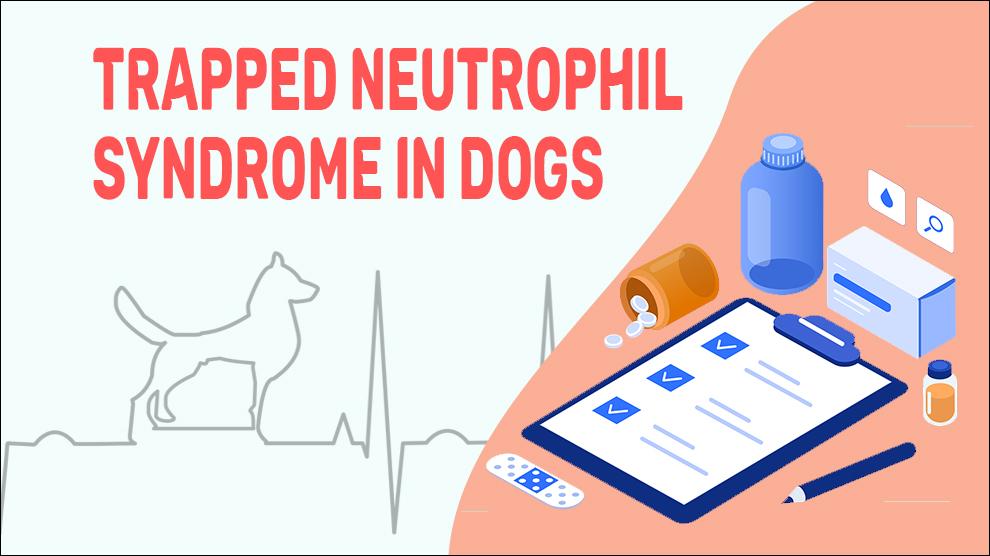What Is Trapped Neutrophil Syndrome In Dogs?
Trapped neutrophil syndrome (TNS) is hereditary autosomal recessive neutropenia known only in Border Collies that has compromised the immune system, resulting in chronic infection in affected collies. In this case, neutrophils are produced in the bone marrow (the most abundant leukocytes that fight infections) but an efficient release of them into the bloodstream is hampered. Of late, the contributory mutation (VPS13B Exon 19 ‐ chr13) has been detected and a DNA-based diagnosis is now available.
Most commonly, affected dogs present symptoms of immune dysfunction between the ages of 6-12 weeks. mildly affected dogs do not show signs of disease until 1- 2 years of age. The severity of Neutrophil syndrome can differ and any of the body systems can be affected: respiratory, musculoskeletal, gastrointestinal, skin, etc. The affected pups have typical facial deformities including a slender, elongated skull resembling that of a ferret and when compared to unaffected littermates, they are usually smaller.
Trapped Neutrophil Syndrome is an Autosomal Recessive condition in dogs means that they must receive one from each parent (two copies of the mutated gene) to develop the disease. Overall, carrier dogs are heterozygous and they do not manifest clinical signs of the disease but when bred with another carrier of the same gene, the resulting pups having the disease are high. In fact, each pup born to this pair has a 25% chance of inheriting the disease and a 50% chance of inheriting one copy of the VPS13B gene mutation.
Symptoms Of Trapped Neutrophil Syndrome In Dogs
- Abnormally narrow head (ferret-like)
- Inability to nurse properly
- Smaller than other puppies
- No weight gain normally
- Lack of interest in surroundings
- Weakness
- Depression
- Lameness
- Swollen joints
- Higher than normal body temperature
Treatment Options For Trapped Neutrophil Syndrome In Dogs
There is no specific cure for TNS however it can be treated to relieve symptoms
TNS treatment in dogs focuses on putting brakes on the disease progression, reducing the suffering of the pets, and improving the quality of life for the pet
For infection: Metronidazole (Flagyl, Protostat, Metizol, Metrogel)
NSAIDs like Carprofen, Meloxicam, Firocoxib, Deracoxib, Etodolac
Pain-relieving medications: Mantadine, Tramadol, Gabapentin, etc
Immunosuppressive or anti-inflammatory medications: Cyclosporine, mycophenolate mofetil, leflunomide, or Azathioprine
Home Remedies For Trapped Neutrophil Syndrome In Dogs
Optimizing your pet’s Compromised Immune conditions must be the top priority
Diet: Wholesome, nutritious diet formulated for the dog’s size and lifestyle
Supplements: Immune-boosting supplements
How To Prevent Trapped Neutrophil Syndrome In Dogs?
- The carrier dog has one allele (copy) of the normal gene and an allele of the mutant gene.
- The carrier dogs are unlikely to develop Trapped Neutrophil Syndrome (TNS) but it can transmit to its pup's genetic code with a 50% probability.
- During breeding, identified Carriers' dogs are bred to dogs that did not inherit the same mutation.
- Carrier to carrier should be completely avoided as 50% of their offspring in a litter is expected to be affected.
- Genetic screening tests are available and the mutation responsible can be revealed directly. Recent methods provide higher accuracy and can be done for dogs of any age.
Affected Dog Breeds Of Trapped Neutrophil Syndrome
Border Collie, Puppies
Causes And Prognosis For Trapped Neutrophil Syndrome In Dogs
1. Causes:
The cause of TNS is a mutation of the VPS13B Exon 19 ‐ chr13, which is only found in Border Collies.
2. Mortality:
The affected puppies without treatment will die within 4 months of age.
3. Diagnosis:
- A complete blood count (CBC), chemistry profile
- PCR-based assay
- Bone marrow biopsy
- X-rays
4. Prognosis:
The trapped neutrophil syndrome can be mild to severe. Prognosis is typically good for a complete recovery in mild cases. However, this condition is usually fatal within the first year of life.
When To See A Vet For Trapped Neutrophil Syndrome In Dogs?
Contact your vet right away, if you notice any of the following:
- Abnormally narrow head (ferret-like)
- Inability to nurse properly
- Smaller than other puppies
- No weight gain normally
Food Suggestions For Trapped Neutrophil Syndrome In Dogs
Foods to avoid:
- Tougher meats/fatty foods/high in fiber
- crunchy or chewy or greasy, oily, spicy foods
- Dairy products like milk, yogurt, etc
- Roasted nuts and bread products
What to feed:
- Provide easily digestible lean cuts of meat. - Beef, pork, fish, and poultry (cooked and drained of excess fat)
- Milk and milk products (Cottage cheese, yogurt), Calcium-fortified foods, and beverages
- Plant-based protein sources –Chickpeas, green beans, Lentils, cooked legumes
- Vitamins: Broccoli, Brussel sprouts, spinach, kale, papaya, strawberries, and pineapple
- Calcium-rich foods and supplements: Green leafy vegetables, broccoli, White beans, salmon, Sardines, etc
Conclusion
Unfortunately, TNS is almost always fatal within the first year of life. Euthanasia may be a better option if the pet is having frequent infections and pain to humanely spare your pet from suffering.

















